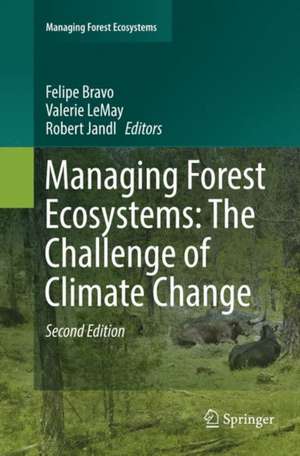Managing Forest Ecosystems: The Challenge of Climate Change: Managing Forest Ecosystems, cartea 34
Editat de Felipe Bravo, Valerie LeMay, Robert Jandlen Limba Engleză Paperback – 9 iun 2018
Given the significant role that forests play in the climate system – as sources, sinks, and through carbon trading – this book update the current scientific evidences on the relationships between climate, forest resources and forest management practices around the world.
By including the forest scientists’ expertise from around the world, the book presents and updates a depth analysis of the current knowledge, and a series of case studies focused on the biological and the economic impacts of climate change in forest ecosystems in Africa, Asia, Europe and North and South America.
The book will form a valuable resource for researchers and advanced students dealing with sustainable forestry, climate change issues and the effects of climate change on natural resource management.
| Toate formatele și edițiile | Preț | Express |
|---|---|---|
| Paperback (1) | 1049.46 lei 38-44 zile | |
| Springer International Publishing – 9 iun 2018 | 1049.46 lei 38-44 zile | |
| Hardback (1) | 1172.65 lei 38-44 zile | |
| Springer International Publishing – 10 apr 2017 | 1172.65 lei 38-44 zile |
Din seria Managing Forest Ecosystems
- 18%
 Preț: 945.79 lei
Preț: 945.79 lei - 18%
 Preț: 1394.03 lei
Preț: 1394.03 lei -
 Preț: 367.69 lei
Preț: 367.69 lei - 18%
 Preț: 1113.71 lei
Preț: 1113.71 lei - 15%
 Preț: 642.21 lei
Preț: 642.21 lei -
 Preț: 431.74 lei
Preț: 431.74 lei - 24%
 Preț: 1042.44 lei
Preț: 1042.44 lei - 15%
 Preț: 711.21 lei
Preț: 711.21 lei - 24%
 Preț: 787.54 lei
Preț: 787.54 lei - 15%
 Preț: 646.62 lei
Preț: 646.62 lei - 15%
 Preț: 645.60 lei
Preț: 645.60 lei - 18%
 Preț: 1242.03 lei
Preț: 1242.03 lei - 15%
 Preț: 648.24 lei
Preț: 648.24 lei - 15%
 Preț: 693.90 lei
Preț: 693.90 lei - 24%
 Preț: 799.28 lei
Preț: 799.28 lei - 18%
 Preț: 1229.10 lei
Preț: 1229.10 lei - 18%
 Preț: 943.43 lei
Preț: 943.43 lei - 18%
 Preț: 948.92 lei
Preț: 948.92 lei - 24%
 Preț: 778.95 lei
Preț: 778.95 lei - 18%
 Preț: 945.62 lei
Preț: 945.62 lei - 18%
 Preț: 943.88 lei
Preț: 943.88 lei - 18%
 Preț: 1544.00 lei
Preț: 1544.00 lei - 18%
 Preț: 946.55 lei
Preț: 946.55 lei - 18%
 Preț: 1244.71 lei
Preț: 1244.71 lei - 18%
 Preț: 949.73 lei
Preț: 949.73 lei - 18%
 Preț: 967.08 lei
Preț: 967.08 lei - 24%
 Preț: 849.91 lei
Preț: 849.91 lei - 24%
 Preț: 903.02 lei
Preț: 903.02 lei - 18%
 Preț: 952.26 lei
Preț: 952.26 lei - 20%
 Preț: 592.63 lei
Preț: 592.63 lei
Preț: 1049.46 lei
Preț vechi: 1380.88 lei
-24% Nou
Puncte Express: 1574
Preț estimativ în valută:
200.84€ • 218.08$ • 168.70£
200.84€ • 218.08$ • 168.70£
Carte tipărită la comandă
Livrare economică 19-25 aprilie
Preluare comenzi: 021 569.72.76
Specificații
ISBN-13: 9783319803067
ISBN-10: 3319803069
Pagini: 452
Ilustrații: XI, 452 p. 106 illus., 50 illus. in color.
Dimensiuni: 155 x 235 mm
Ediția:Softcover reprint of the original 2nd ed. 2017
Editura: Springer International Publishing
Colecția Springer
Seria Managing Forest Ecosystems
Locul publicării:Cham, Switzerland
ISBN-10: 3319803069
Pagini: 452
Ilustrații: XI, 452 p. 106 illus., 50 illus. in color.
Dimensiuni: 155 x 235 mm
Ediția:Softcover reprint of the original 2nd ed. 2017
Editura: Springer International Publishing
Colecția Springer
Seria Managing Forest Ecosystems
Locul publicării:Cham, Switzerland
Cuprins
Part I. Introduction F. Bravo et al.- Part II. Overview of Climate Change and Forest Responses.- 2. A Mechanistic View of the Capacity of Forests to Cope with Climate Change; F. Valladares.- 3. Greenhouse-gas Emissions from Temperate European Mountain Forests; R. Jandl et al.- Part III. Monitoring and Modeling.- 4. Estimating Carbon Stocks and Stock Changes in Forests: Linking Models and Data across Scales; V. LeMay et al.- 5. Forest Eco-physiological Models and Carbon Sequestration; T. Keenan et al.- 6. Influence of Climatic Variables on Crown Condition in Pine Forests in Northern Spain; A.V. Sanz-Ros et al.- 7. Changing Trends of Biomass and Carbon Pools of Mediterranean Pine Forests; A.C. Gómez et al.- 8. REDD+ and Carbon Markets: the Ethiopian Process; J. Gonzalo et al.- Part IV. Economic and Management Impacts.- 9. Influence of Carbon Sequestration in an Optimal Set of Coppice Rotations for Eucalyptus Plantations; L. Diaz-Balteiro, L.C.E. Rodríguez.- 10. Use of Forests and Wood Products to Mitigate Climate Change; L. Valsta et al.- 11. Biomass Forest in Sweden and Carbon Emissions Balance; T. Johansson.- 12. Taper Equations and Wood Products: Assessing the Carbon Flow of the Forest through its Products; I. Lizarralde et al.- 13. Forest Carbon Sequestration: The Impact of Forest Management; F. Bravo et al.- 14. Effects of Forest Age Structure, Management and Gradual Climate Change on Carbon Sequestration and Timber Production in Finnish Boreal Forests; J. Garcia-Gonzalo et al.- Part V. Case Studies.- 15. Mediterranean Pine Forests: Management Effects on Carbon Stocks; M. del Río et al.- 16. Carbon Sequestration of Ponderosa Pine Plantations in Northwestern Patagonia; P. Laclau et al.- 17. Assessing Pine Wilt Disease Risk under a Climate Change Scenario in Northwestern Spain; G. Pérez et al.- 18. Soil Organic Carbon Sequestration under Different Tropical Cover Types in Colombia; F. Moreno et al.- 19. Carbon Sequestration Potential of Mangroves in Southeast Asia; M.N. Suratman.- 20. Modeling of Carbon Sequestration in Rubben (Hevea brasiliensis) Plantations; E.A.R.E. Ariff et al.- 21. Carbon Sequestration in Mediterranean Oak Forests; I. Cañellas et al.- 22. Forest Management in the Sahel and Ethiopian Highlands and Impacts on Climate Change; W. Tadesse et al.
Recenzii
“This updated second edition draws on recent research and case studies in a range of geographic and ecological settings to explore the relationships between managed forests and climate change. … This book will be of most use to students, scholars, and practitioners interested in forest management, as well as forest and environmental policy in the context of climate change. Summing Up: Recommended. Upper-division undergraduates and above; faculty and professionals.” (J. L. Rhoades, Choice, Vol.55 (2), October, 2017)
Textul de pe ultima copertă
During the last decades climate changes, particularly warming trends, have been recorded around the globe. Climate change shaped the political agenda during the last decade with three issues as hot topics, commonly making the headlines: carbon budgets, impact and mitigation of climate change. Changes in climate have become evident through insect epidemics, drought episodes and intense forest and unusual storm activities. Climate changes are expected to impact vegetation manifesting as changes in vegetation extents, tree species compositions, growth rates, and mortality rates, and also as species migrations. Over a number of sessions, the International Panel on Climate Change (IPCC) has discussed how forests may be impacted and also how forests and forest management practices may be used to mitigate the impacts of changes in climate, particularly to possibly reduce the rate of change. Given the significant role that forests play in the climate system – as sources, sinks, and through carbon trading – this book update the current scientific evidences on the relationships between climate, forest resources and forest management practices around the world. This new book edition, which forms part of Springer’s book series Managing Forest Ecosystems, presents an update on state-of-the-art research results, visions and theories, as well as specific methods for sustainable forest management under changing climatic conditions. The book contains a wealth of information which may be useful to foresters and forest managers, politicians and the legal and policy environment and forestry administrators by presenting and analysis of the current knowledge, and a series of case studies focused on the biological and the economic impacts of climate change in forest ecosystems in Africa, Asia, Europe and North and South America.
Caracteristici
Numerous step-by-step tutorials help the reader to learn quickly A special chapter on next generation Flash prepares readers for the future Includes ten tips on how to protect flash sites from hacker












